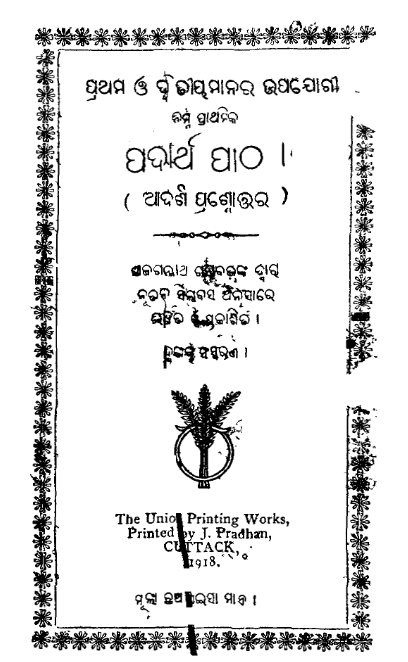Published in 1918, Nimna Prathamika Padartha Patha stands as a significant educational textbook in the Odia language, specifically designed for early learners. This pioneering work has played an essential role in shaping the educational landscape of Odisha during a time when the need for vernacular education was paramount. The text serves not only as a conduit for learning but also as a cultural artifact that reflects the values and priorities of its time.
The early 20th century was a transformative period in India, marked by social reform movements and a push for greater educational opportunities, particularly in regional languages. Nimna Prathamika Padartha Patha emerged against this backdrop, addressing the necessity for a foundational education system that could cater to the linguistic and cultural nuances of Odia-speaking children. The textbook was part of a broader movement to promote education in local languages, empowering students to learn in their mother tongue and fostering a sense of identity and pride.
The textbook is meticulously structured to facilitate a gradual learning process, focusing on essential subjects such as language, mathematics, and moral education. Its content is not only informative but also engaging, featuring verses, stories, and exercises designed to keep young learners actively involved. The use of simple, relatable language allows children to grasp concepts easily, making the learning experience enjoyable and effective.
One of the standout features of Nimna Prathamika Padartha Patha is its emphasis on moral and ethical teachings. The inclusion of fables and parables instills values such as honesty, kindness, and respect, which are integral to character development at an early age. By blending education with essential life lessons, the textbook encourages students to grow not only academically but also as responsible citizens.
Nimna Prathamika Padartha Patha serves as more than just an educational resource; it is a reflection of Odia culture and heritage. The textbook incorporates local folklore, traditional stories, and references to regional customs, allowing children to connect their learning with their cultural surroundings. This cultural integration reinforces the importance of language as a vehicle for preserving and promoting a community’s identity.
Moreover, the educational philosophy embedded in the textbook emphasizes critical thinking and creativity. The exercises encourage students to express themselves and explore their ideas, laying the groundwork for a more comprehensive educational approach that extends beyond rote memorization.
The publication of Nimna Prathamika Padartha Patha marked a significant milestone in the development of Odia education. Its influence can be seen in subsequent generations of learners who benefited from a curriculum enriched by the principles established in this early textbook. As Odia education evolved, the foundational concepts introduced in Nimna Prathamika Padartha Patha continued to resonate, shaping pedagogical practices in the region.
Books Info
| Books name | Nimna Prathamika Padartha Patha / ନିମ୍ନ ପ୍ରାଥମିକ ପଦାର୍ଥ ପାଠ |
| Author | Jagannatha Rayabadu |
| No Of pages | 26 |
| Publisher | NA |
| Publication | 1918 |
| Printed At | The Union Printing Works |
| Distributor | NA |

